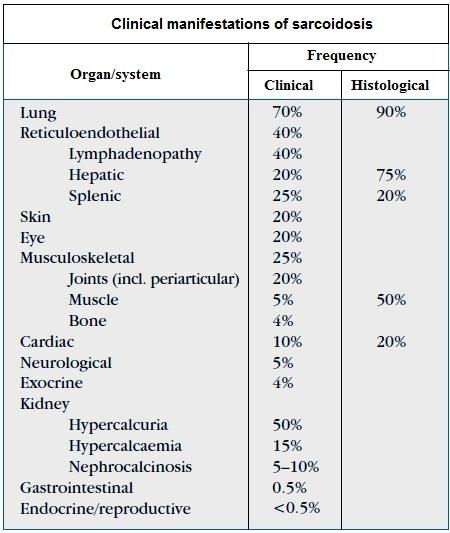Sarcoid
Sarcoidosis is a multisystemic inflammatory disorder of unknown etiology characterized by the accumilation of non-caseating epithelioid granulomas in involved organs (1).
- the disease may occur at any age but is usually present in adults under the age of 50 years with a peak in incidence between the 20 and 39 years of age (2)
- any organ system can be involved but lung involvement dominate in most of patients (2)
- diagnosis is made when clinicoradiologic findings are supported with histological analysis of tissue samples for evidence of noncaseating epitheliod cell granulomas (3).
The course of the disease is variable:
- acute sarcoidosis
- usually follows a benign course
- more commonly seen in young white adults
- characterised by diffuse usually bilateral ankle swelling with or without erythema nodosum and bilateral hilar lymph node involvement
- chronic and recurrent sarcoidosis,
- affects elderly patients, more commonly the Afro-Caribbean population and may have multisystem involvement
- lung infiltration may progress to pulmonary fibrosis
- may be resistant to conventional treatment (4)
The clinical manifestations of sarcoidosis are diverse (4):
- the accumulation of T-lymphocytes, mononuclear phagocytic cells and non-caseating granulomas occurs in involved organs. These granulomas may resolve spontaneously or lead to secondary fibrosis and permanent organ damage
- sarcoidosis involves the lungs in over 90% of cases and commonly the lymphoreticular system, skin, eyes, muscles and joints. Less commonly other organs, including the heart, kidneys, brain and peripheral nervous system, may be clinically affected

Reference:
- (1) Smith G et al. Advances in the genetics of sarcoidosis. Clin Genet. 2008;73(5):401-12.
- (2) Dempsey OJ et al. Sarcoidosis. BMJ. 2009 Aug 28;339:b3206
- (3) Judson MA. The diagnosis of sarcoidosis. Clin Chest Med. 2008;29(3):415-27.
- (4) Bourke b. Musculoskeletal aspect of sarcoidosis. Topical Reviews 2009;2
Related pages
Create an account to add page annotations
Annotations allow you to add information to this page that would be handy to have on hand during a consultation. E.g. a website or number. This information will always show when you visit this page.